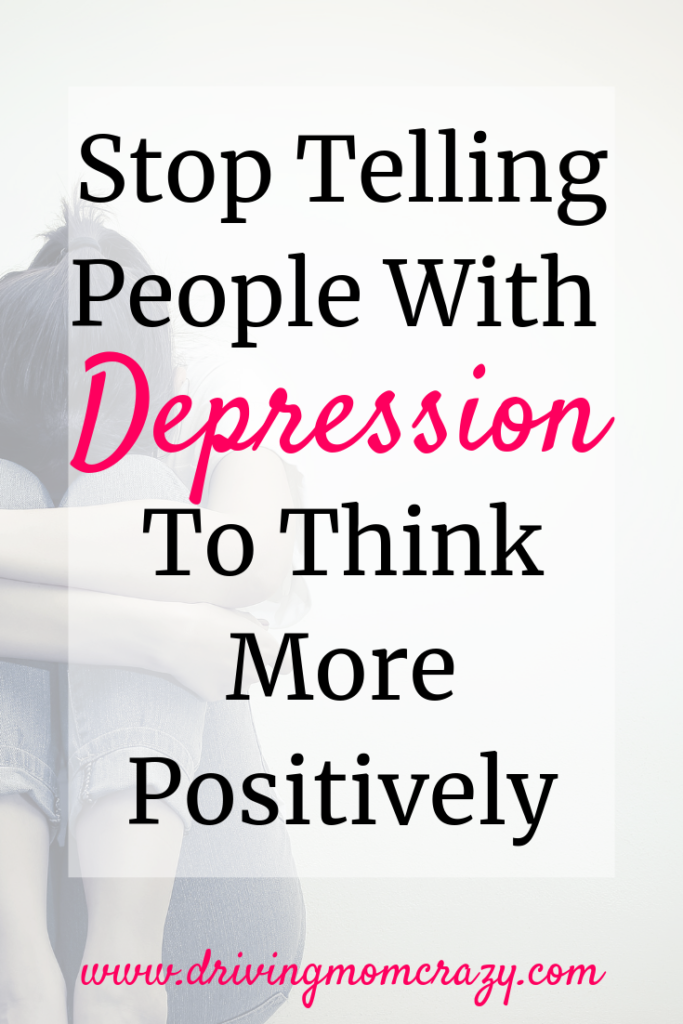This post contains affiliate links. Please read our disclosure policy for full details.
I once had a “friend” tell me that taking antidepressants was an awful thing to do and that I was poisoning my baby (who was breastfeeding at the time). She said I should try natural remedies and think positively. That was a fun conversation.
I’ve learned to live with depression, but it can still be difficult. Unfortunately what makes living with this illness worse is the amount of misunderstanding that is still out there about treating mental health conditions.
The things people say out of ignorance can hurt. Even well-meaning advice can be damaging to a person suffering from depression or any other mental illness. I want to explain exactly why the particular advice of “thinking more positively” is based on a false premise.
The false premise is that the person with depression is intentionally producing these thoughts; therefore they should be able to reverse or eliminate them. In reality, there is an underlying problem that is causing this part of their brain to not work properly. By telling someone to “think positively” you are asking them to use a part of their body that doesn’t work correctly to fix the problem. That is not only dangerous, but it will not work. You are setting that person up for failure and will only reinforce the shame-producing thought pattern of depression.
Let me put this into perspective for you. A person with depression is already having thoughts that they are worthless and can’t do anything right. They may feel mentally paralyzed. Someone tells them to try to think positively, so they try to change their thoughts. They can’t. This confirms to them that they are indeed a failure, weak, and stupid, because they cannot do what everyone is telling them that they should be able to do. The situation begins to feel hopeless because it seems like there is no way to overcome this chronically depressed state.
Depression requires professional help, just like any other health condition. Telling someone to “change their thoughts” is like telling a diabetic that their pancreas should just make more insulin. Or that a person with cancer should just stop growing cancer cells. Or that a person with asthma should just “breathe better.” Okay, that would be nice, but..
It.Does.Not.Work.Like.That.
These are chronic health conditions that require medical attention. Mental health is a part of physical health. Treatment is different for everyone, but you cannot overcome any illness by simply commanding the sick body part to heal itself.
For many people, depression and/or other mental health conditions are lifelong diseases that needs consistent, proactive treatment. There may be times where the illness is under control and stable. There may be times where there is a flare-up because of an environmental change. There may be a flare-up for no apparent reason. There are times for changes in medication. You need regular check-ups. New therapies may become available. Sometimes things can take a turn for the worse. This illness can be life-threatening.
Some days the depression may seem like it’s not even there anymore. Maybe it’s really gone. Maybe it’s not. Maybe it could come back. You never really know for sure.
But one thing I do know: the last thing a person needs to hear is that they are “doing” their treatment wrong, or that they shouldn’t need treatment. People who seek help are trying to make their lives better. They are trying to overcome this illness. They are trying to survive.
No one deserves criticism for that.
The best thing you can do for a family member or friend with depression is to encourage them to seek professional help. Read more at
https://nami.org/.

You Might Also Like:
- What Moms With Depression NEED to Know
- Why Antidepressants Make Me a Better Mom
- I Wasn’t Prepared to Be a Mom




I want to clap for this one. I juggle both anxiety and depression, and I thank God that my fiance does his best to be super patient with me. I feel bad whenever he constantly asks if he has done anything wrong if I’m in a negative mood because I literally cannot explain what’s wrong. I started using an exercise to list at least 10 things I’m grateful for each night to help put me a little at ease. So far, it has helped a bit.
Thanks for sharing your story! I’m glad to hear that gratitude lists are helpful for you. When I remember to do them, it does make a difference! Sometimes it takes a combination of multiple things to pull me out of a low time, and sometimes I just have to ride it out. Thankfully meds and therapy have gotten me through the roughest of times. ❤️
Thank you so much for this post! I needed a good read this AM to start my day. I also struggle with anxiety and depression and I am on vacation and supposed to be happy! I needed this and to share this also…thank you.
I’m so glad it was helpful, and I hope your vacation gets better! ❤️
Thank you for sharing! Your message is so important and one that needs to be talked about more so those suffering know they aren’t alone.
Thank you for reading! ❤️
Thank you for sharing this post! Depression can take so many forms and is certainly different than just feeling sad, although it might present as sadness.
It’s so important to talk about and to learn ways to be supportive of those suffering!
Yes it can present itself in many different ways. Thank you for reading!
This post is absolutely fantastic and very eye opening. I love your analogy about diabetes, and mental health! I think I try and mean well when I tell other to “think positive” but can understand why this simply can’t and won’t work and is actually not helpful at all.
Yes I’m sure your friends or family know you mean well! I think them knowing you are there for them means a lot. ❤️ Friendship and support are so helpful because you don’t feel so alone.
Ugh! I’m sure people think they are helping with these types of ignorant comments but it’s essentially the same as telling someone with chronic pain to wish it away!